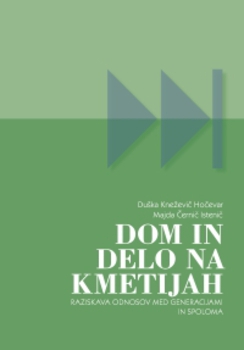Dom in delo na kmetijah. Raziskava odnosov med generacijami in spoloma
The monograph ('Home and Work on Farms: The Study of Generations and Gender Relationships') consists of eight thematically related chapters discussing ‘home and work’ in the farm population. The authors interpret some basic results of empirical research on generations and gender relations on farms through the review and analysis of some strategic national documents on farming development in Slovenia and domestic and foreign studies on the issue.
The monograph presents usually neglected topics on intertwined spheres of work and home of farmers, so characteristic for their lifestyle. This knowledge is of the utmost importance in view of the fact that agricultural activities in Slovenia are predominantly carried out on family farms despite the fact that their number has been decreasing. The facts on the ground also show the endangered ‘vitality’ (as to the size of farms, education of its members and their fertility) of family farms in Slovenia due to unfavourable land holding structure, poor age and education characteristics of the farm population and the difficulties related to the unsecured successors. The monograph brings new information on relationships among family members on contemporary farms in the view of facilitating/hindering vitality on the farm in particular and in farming in general. The research results show that compared to the non-beneficiaries of two measures (Setting Up of Young Farmers and Early Retirement of Farmers), the beneficiaries (young farmers) are willing to continuing with farming, they oppose the equal distribution of agricultural property among the heirs, and live on bigger farms. Young farmers more successfully harmonise various interests of their households’ members, and have higher education and fertility compared to the non-beneficiaries and two other observed groups (urban and rural people). They also express greater concern in care giving for the older generation. However, the young farmers, as the most likely candidates for agricultural development in Slovenia, do not participate in wider social networks; their social networks are still limited to their closer siblings only, division of labour among the family members is less flexible in view of their particular interests, and the younger generation is still committed to providing care for the older generation either due to the ‘preservation of tradition’ or the lack of some services in their living environment.
The monograph may be of interest to various professionals working on the issue of family farming and rural development and scholars and students of rural sociology and similar disciplines of social science and humanities.
Downloads

Series
License

This work is licensed under a Creative Commons Attribution-NonCommercial-NoDerivatives 4.0 International License.
